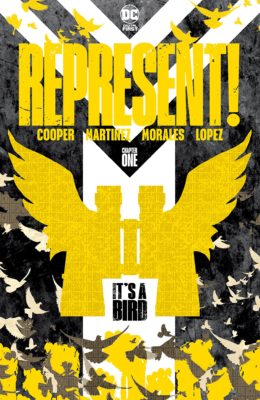
Millions were outraged earlier this year when a woman called the cops on Central Park birdwatcher Christian Cooper claiming, “An African-American man is threatening my life.” Cooper had asked her to leash her dog, as the rules required. The confrontation, which happened the same day as the murder of George Floyd by Minneapolis police, was an example of the kind of harassment and racism Black people face on a regular basis and which sometimes leads to violence.
Cooper, a gay Black editor who used to write DC Comics, joined with artist Alitha E. Martinez to create It’s a Bird, a comic inspired by the incident. It’s now the first chapter in DC’s Represent!, an inclusive anthology series. (The comic is free to download here.) They spoke about the comic at FIT’s third annual Diversity Comic Con, a conference and marketplace highlighting multicultural comic creators that took place virtually Oct. 16 and 17. The discussion was organized by adjunct faculty member Ramon Gil and Jennifer Fuglevand, marketing events manager at DC Entertainment.

In Cooper’s story, when a boy looks at birds through his magic binoculars, he sees historic scenes of police brutality against Black citizens. At the same time, he experiences racism while birding.
Cooper received his father’s binoculars for his 50th birthday a few years back, and he brought them into the comic to represent “intergenerational transmittal of knowledge, of caring, of Blackness.” He added, “They show things beyond what is seen through the physical spectrum. Because they’ve seen civil war, because they’ve witnessed what Black folk went through in the civil rights movement, they can summon these spirits; they can see these events.”
Martinez acknowledged the challenge of illustrating a comic based on a real event, and the importance of portraying the characters with humanity. “It’s not superheroes,” she said. “This happened to real people, so you have to be respectful of those moments.”
The boy in the story has an encounter with a female dog owner that echoes what happened to Cooper. In the comic, however, the boy walks away, and her voice fades into the background. Cooper made a deliberate choice not to focus the story on her. “It’s not about the crazy white lady,” he says. “It’s about those we have lost and how we keep from losing any more.”
Watch the entire conversation below.
